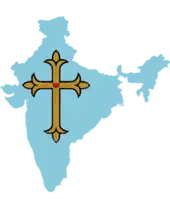Giuseppe Maria Bernini
Giuseppe Maria Bernini (English: Joseph Mary Bernini, Hindustani: ज्यूसेपे मारिया बेर्निनी (Devanagari), جیوسپی ماریا بیرنینی (Nastaleeq)), who lived from 1709–1761, was an Italian Capuchin missionary, physician and Orientalist.[2] His efforts led to the establishment of the northern Indian subcontinent's oldest Christian community—the Bettiah Christians.[3] Bernini was the first European to author tracts in Hindustani (Hindi-Urdu), as well as to translate Indian classics from Sanskrit into Italian.[2]
Giuseppe Maria Bernini da Garghano | |
|---|---|
| Vice-prefect of the Tibet-Hindustan Mission | |
| Church | Catholic Church |
| Personal details | |
| Born | Bernardino Bernini 2 September 1709[1] |
| Died | 15 January 1761 |
| Nationality | Italian |
| Denomination | Roman Catholic |
| Residence | India |
Ordination history of Giuseppe Maria Bernini | |||||||||||
|---|---|---|---|---|---|---|---|---|---|---|---|
| |||||||||||
| Part of a series on |
| Christianity in India |
|---|
 |
Life
Bernini was born at Gargnano in Lombardy on 2 September 1709.[1] He met Horatio della Penna of the Tibetan Mission in Rome, and himself travelled to Lhasa. He acquired a knowledge of the languages and dialects of India, being fluent in Hindustani and Sanskrit, as well as in Latin, French, German and Italian.[2] Bernini's skills as a medical doctor were known throughout northern India, Tibet and Nepal, though he also practiced faith healing.[2]
In 1713, Christian missionaries of the Roman Catholic Order of Friars Minor Capuchin established a hospice in Patna, India.[3] Maharaja Dhurup Singh, the ruler of the Bettiah Raj in India, developed a close friendship with Giuseppe Maria Bernini.[3] The queen of Maharaja Dhurup Singh, was ill and Bernini came to their Bettiah Palace to pray for her and treat her; the queen was healed of her illness that was said to be incurable, and as a result, Singh invited Bernini to found the Bettiah Christian Mission.[4][3] To secure Bernini's presence at the Bettiah Fort, Maharaja Dhurup Naryan Singh wrote to Pope Benedict XIV asking that priests be sent to Bettiah and on 1 May 1742, Pope Benedict XIV replied stating that the Capuchin priests could remain there and preach the Gospel.[5]
In 1749, Joseph Mary Bernini was transferred to Chandannagar to minister to European Christians but he became "sickened at heart with the loose morals of the settlers in the colonial [French] settlement" and wished to be transferred to a location "where there were no Europeans."[3] As such, he returned to his "beloved Bettiah" and Raja Dhurup Singh provided Bernini and his fellow priests the wood to erect a Catholic Christian church there.[3]
Joseph Mary Bernini spent his life establishing what would become the northern Indian subcontinent's oldest extant Christian community—the Bettiah Christians.[3] When he died on 15 January 1761, his body was said to produce the odour of sanctity.[2]
Works
In his travels through the country he made a study of the manners, languages, customs, and religious beliefs and practices of the people. The results of his studies were collected in his work: "Notizie laconiche di alcuni usi, sacrifizi, ed idoli nel regno di Neipal, raccolte nel anno 1747". This work has never been published, but was preserved in manuscript in the library of the Propaganda at Rome, and in the museum of Cardinal Borgia. Bernini also wrote "Dialogues", in one of the Indian languages, also preserved in manuscript in the Propaganda; a translation of "Adhiatma Ramayana"; one of "Djana Sagara", and a collection of historical studies under the title, "Mémoires historiques" (Verona).
Bernini authored a Hindustani-Italian dictionary, which Joseph da Rovato declared was "perfect in every respect".[6]
References
- D'Souza, Daniel Anthony (1993). Capuchin Missions in India. Capuchin Publications. p. 51.
The Christian colony of Bettiah was founded by Fr. Joseph Mary Bernini. His former name was Bernadino. He was born in Count Bernini family on September 2, 1709 at Gargnano, Brescia, Northern Italy. He studied Latin, French, German ...
- Putra, Bharat. "Christianity in Bihar". The Bihar Times. Retrieved 19 November 2020.
- John, Jose Kalapura (2000). Proceedings of the Indian History Congress, Vol. 61. Indian History Congress. pp. 1011–1022.
- "Bihar Christians have fostered faith harmony 250 years". Union of Catholic Asian News. 6 November 1995. Retrieved 14 November 2020.
Cherubim John, a writer and historian, said the Bettiah community began after Italian Capuchin Father Joseph Mary Bernini cured the local queen of an "incurable" illness. The king donated 16 hectares of land later known as the "Christian Quarters" to the Capuchins. The king allowed Father Bernini, who was on his way to Tibet, to preach, and helped build a church next to his palace.
- "Diocese of Bettiah". Union of Catholic Asian News. Retrieved 15 November 2020.
One of the Capuchin missioners, Father Joseph Mary, spent some time in Bettiah in 1740 en route to Tibet, and he managed to cure the queen of Bettiah of a serious malady. The King of Bettiah, Dhruva Singh, asked the priest to stay in his kingdom, but the priest said he could not do so unless the Vatican granted permission. Subsequently, Dhruva Singh wrote two letters to Pope Benedict XIV requesting that the missioners be allowed to open a station in Bettiah. The pope replied to him on May 1, 1742, saying the Capuchins could stay and preach the Gospel in the kingdom. Father Joseph Mary thus founded the Bettiah Mission in 1745.
- Vannini, R. Fulgentius (1977). Christian Settlements in Nepal during the Eighteenth Century. Devarsons. p. 129.
- Attribution
![]() This article incorporates text from a publication now in the public domain: Herbermann, Charles, ed. (1913). "Giuseppe Maria Bernini". Catholic Encyclopedia. New York: Robert Appleton Company.
This article incorporates text from a publication now in the public domain: Herbermann, Charles, ed. (1913). "Giuseppe Maria Bernini". Catholic Encyclopedia. New York: Robert Appleton Company.